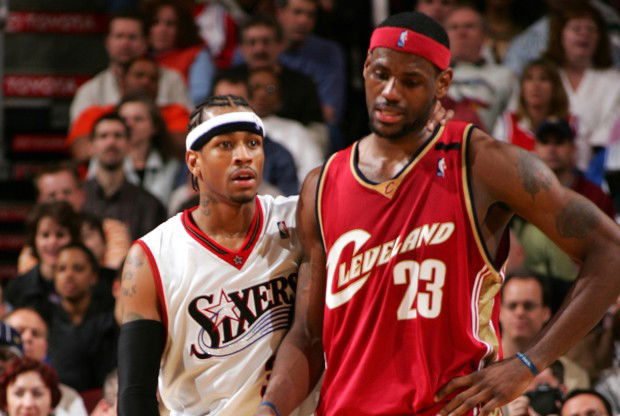

In 2003, the three biggest shoe companies in the world were vying for the signature of an 18-year-old LeBron James. Having graced the cover of Sports Illustrated at just 17 years of age and was viewed as the highest-profile school player in history. Adidas made an offer to James just before he graduated high school and Nike had been watching him since eighth grade, but the biggest offer James received was from Reebok and he chose to hear them out first.
Watch What’s Trending Now!
Since Michael Jordan and Kobe Bryant, no player had drawn as much anticipation as the future ‘King James.’ Here was a young star from Akron, Ohio, set to take over the NBA for the next two decades—and he did. Now playing alongside his son for the Los Angeles Lakers, James’ legacy is one for the ages, including his $90 million shoe deal with Nike. Interestingly, Allen Iverson nearly convinced him to sign with Reebok for close to $100 million.
On May 7, 2003, James paid a visit to Reebok headquarters in Canton, Massachusetts. As LeBron entered the building, Reebok CEO Todd Krinsky recalled the pivotal day of negotiations. Starting his career in the mailroom and playing a key role in signing Allen Iverson in 1993, Todd had helped shape Reebok’s brand. He was in the position of vice president of Reebok’s RBK division when the company made the move for James.
ADVERTISEMENT
Determined to add James to Reebok’s roster, Krinsky set out with Iverson himself to sway the young star away from Nike and Adidas’ grasp. “We had Iverson talk to LeBron. A.I. didn’t come to the pitch meeting, but they talked a few times about Reebok. We facilitated an initial call with Allen, who had been at the company for seven years. He had just come off the MVP and NBA Finals season. He had the Answer IV, which was a huge-selling shoe the previous year,” Krinsky mentioned.
At this point, Reebok’s offer to James had ballooned to $100 million over 10 years, after he turned down an initial six-year deal. Reebok had gone all in to secure their man, leaving nothing to chance. Understanding the impact of having a top player in their ranks, Krinsky wanted Iverson to convince LeBron to join Reebok. Krinsky added, “Allen spoke on our behalf and was excited that LeBron was considering joining Reebok.”
Reebok’s Iverson tactic and the massive offer seemed to have worked, according to James’ first agent Aaron Goodwin, who had led the negotiations for the player. Reebok executive Tom Shine and then-CEO Paul Fireman flew to Ohio the night before the draft. They met with James in a suite at the Radisson Hotel in Akron, anticipating to close the historic deal.
ADVERTISEMENT
Speaking in 2003, Goodwin recalled, “I thought he was going to go with Reebok. At one point we stepped outside the room and LeBron said, ‘Hey, I feel comfortable with them.’ Three hours later, he chose Nike.” Adidas had gone out of the picture after they offered $60 million to secure James. But having seen what he was worth with Reebok’s massive offer, Adidas hardly stood a chance. Still, why did he choose Nike despite Reebok’s $100 million pitch?
Nike had long been working to develop a connection with James. As mentioned earlier, they had been keeping tabs on LeBron since before he graduated high school. Just weeks after he turned 18, Nike planned out how they would pursue James to sign for them. They called on their three most celebrated basketball designers, Tinker Hatfield, Eric Avar, and Aaron Cooper, who had designed some of the industry’s signature silhouettes for NBA players Michael Jordan, Charles Barkley, Penny Hardaway, and Scottie Pippen. They were asked to collaborate on a shoe for James.
ADVERTISEMENT

ADVERTISEMENT
Even then, Nike’s close to $90 million over 7 years, fell short of Reebok’s revaluated $115 million over the same period. But Nike had one big pull for James. Growing up James had seen Michael Jordan and how iconic he had become on and off the court. Nike’s Jordan commercials and the signature shoe line, his iconic logo were a benchmark for any athlete including the young James. Nike had a big hand in Jordan’s career and James wanted that.
He wanted to play like him, be like him, and have his stardom, being associated with Nike would give him that. Hence, a big part of his motivation to sign with Nike came from wanting to follow Jordan’s legacy. Once this was clear to him, the decision became easy. He signed with Nike and to this day it remains the richest rookie shoe deal signed by a basketball player ever.
Years, later when LeBron James looked back at this decision, he was sure he made the right choice.
ADVERTISEMENT
LeBron James labeled signing with Nike as “best business” decision
15 years after signing with Nike, LeBron James reflected on his choice in 2018 and said, “Signing with Nike is the best business decision I’ve ever made.” It is easy to understand why he thinks so. In 2022, he became the first active athlete ever to become a billionaire, a feat aided by his reported $30 million a year contract with Nike signed in 2015, which is a lifetime contract.
Over the years, Nike has released several sneakers under the name of the Lakers star. Some of the popular signature LeBron James shoes include LeBron Soldier 10, LeBron 7, LeBron 9, and LeBron 21 which were part of the Nike Zoom Air line and inspired by his 8-year-old daughter Zhuri.
ADVERTISEMENT
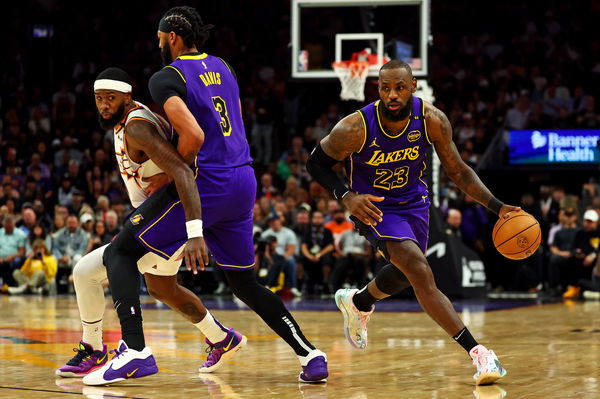
ADVERTISEMENT
Just like his idol Michael Jordan, LeBron James has established a legacy of his own on the court and away from it, thanks to Nike. That pivotal decision 21 years ago, transformed his career and forever linked him with the man he hoped to emulate.
Top Stories
Did Zion Williamson Slide Into Sydney Sweeney’s DMs? Fact Checking the Viral Screenshot

Kevin Durant Confesses Greatest Business Regret That Ended Up Making Kobe Bryant $400 M
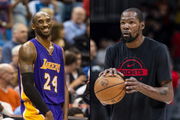
Unrivaled Owner Breanna Stewart Confirms Stance on Project B & Clearly Distinguishes the Two Leagues

Congratulations Pour In for WNBA HoF Sylvia Fowles After Reported Portland Fire Decision
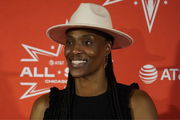
Kevin Durant Places Himself On NBA GOAT List Alongside MJ, LeBron – Leaves Steph Curry Out
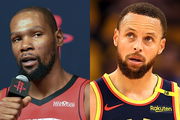
ADVERTISEMENT
ADVERTISEMENT
ADVERTISEMENT

